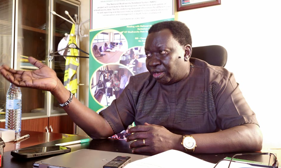South Sudan’s Ministry of Environment and Forestry has accused senior government officials, along with unscrupulous businessmen, of importing and profiting from plastic bags while degrading the environment.
Joseph Africano Bartel, the Undersecretary in the Ministry of Environment, told Radio Tamazuj during an interview on Monday declined to name the officials involved but warned that they will soon be shamed if they do not desist from the practice.
“I am being very diplomatic here, but very soon we will not care who you are because I know some of the people who are importing are very big position holders in government,” he said. “We will identify you, you will be arrested, and you will lose your position.”
The ministry banned single-use plastic bags in 2018, citing severe environmental and health risks.
Bartel stressed that the ban remains in force, yet plastic bags continue to enter South Sudan through porous borders, mainly from Uganda, where production is still allowed.
“Kenya has banned it, Rwanda has banned it, Uganda has not. Now, there is no plastic bag coming officially through the borders, but people are smuggling them,” Bartel stated. “I even found some children in the market carrying them, and they are all made in Uganda.”
He called for a regional solution, urging Uganda to take responsibility and prevent exports into South Sudan. He also appealed to citizens to take ownership of their environment.
“Are you happy seeing all these black bags across your streets and homes? Do you really care for the future of your children and grandchildren?” He asked. Adding: “If we do, let us change our recklessness and behavior toward the environment. It is only you and me who can do it right.”
Plastic bags, he explained, can take 200 to 300 years to degrade, block soil water infiltration, kill animals when consumed, and release cancer-causing toxins when burned.
Officials and environmentalists have repeatedly highlighted the severe health risks of burning plastic waste.
A national study reports that around 73 percent of South Sudan’s solid waste is plastic. During World Environment Day, Environment Minister Josephine Napwon Cosmos urged citizens to reduce their plastic use and adopt sustainable alternatives.
“Let us commit to reducing our plastic footprints… using reusable bags, avoiding single-use plastic, and encouraging our families and friends to do the same,” she said then.
Bartel noted a recent reduction in plastic bottles along the Nile following heavy rains, but warned that single-use bags are on the rise.
“What we need are biodegradable bags or reusable alternatives. Since we don’t yet have recycling capacity, we cannot afford this illegal trade,” he said.
Relatedly, the environment ministry attributed the recent reports of discolored rainwater in Juba to rising levels of air pollution, warning citizens against using rainwater for drinking.
Undersecretary Bartel explained that the phenomenon was caused by a combination of smoke, dust, and soot mixing with rain clouds. He cited recent tire burning near Juba airport, rampant charcoal production, and emissions from vehicles and motorcycles as major contributors.
“Instead of the smoke accessing the atmosphere, it ended up in the overcast clouds, already heavy with water,” he explained. “The soot mingled with the rain and came back as colored water.”
Bartel added that cross-border pollution from Uganda or the Democratic Republic of Congo could also have contributed, since clouds travel long distances before releasing rainfall.
The official warned that South Sudan’s widespread use of two-stroke engine motorcycles and old vehicles without emission controls continues to pollute the air, with long-term health risks.
The government is now working with regional regulators to introduce new standards for vehicles, motorcycles, and generators, with plans to ban two-stroke engines in favor of cleaner four-stroke alternatives.
The ministry is also concerned about the health effects of consuming untreated rainwater.
“Rainwater is good, but not for drinking. Roofs are often rusted or coated with lead. If you drink it directly, you are poisoning yourself,” Bartel said, recommending it instead for washing, irrigation, or other non-consumptive uses.
He added that pollution poses direct health risks to humans and animals through the food chain.
“Any pollution of air, soil, or water has a direct impact on our health. If the environment is clean, our health is clean. If we pollute, the same pollution comes back to us,” he stressed.
The undersecretary urged citizens to take responsibility for their environment, warning that the government cannot solve the crisis alone.
“Plastic bags and smoke do not walk on their own; it is we who throw them away and pollute the air. If we don’t change our behavior, our children and grandchildren will pay the price,” he warned.
The ministry says water supply expansion through chlorine purification should be prioritized over reliance on rainwater harvesting.




